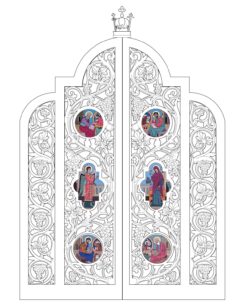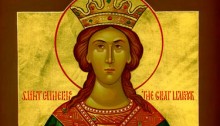Andrew, the son of Jonah and brother of Peter, was born in Bethsaida and was a fisherman by trade. At first he was a disciple of St. John the Baptist, but when St. John pointed to the Lord Jesus, saying, Behold the Lamb of God! (John 1:36), Andrew left his first teacher and followed Christ. Then, Andrew brought his brother Peter to the Lord. Following the descent of the Holy Spirit, it fell by lot to the first apostle of Christ, St. Andrew, to preach the Gospel in Byzantium and Thrace, then in the lands along the Danube and in Russia around the Black Sea, and finally in Epirus, Greece and the Peloponnese, where he suffered. In Byzantium, he appointed St. Stachys as its first bishop; in Kiev, he planted a Cross on a high place and prophesied a bright Christian future for the Russian people; throughout Thrace, Epirus, Greece and the Peloponnese, he converted multitudes of people to the Faith and ordained bishops and priests for them. In the city of Patras, he performed many miracles in the name of Christ, and won many over to the Lord. Among the new faithful were the brother and wife of the Proconsul Aegeates. Angered at this, Aegeates subjected St. Andrew to torture and then crucified him. While the apostle of Christ was still alive on the cross, he gave beneficial instructions to the Christians who had gathered around. The people wanted to take him down from the cross but he refused to let them. Then the apostle prayed to God and an extraordinary light encompassed him. This brilliant illumination lasted for half an hour, and when it disappeared, the apostle gave up his holy soul to God. Thus, the First-called Apostle, the first of the Twelve Great Apostles to know the Lord and follow Him, finished his earthly course. St. Andrew suffered for his Lord in the year 62. His relics were taken to Constantinople; his head was later taken to Rome, and one hand was taken to Moscow. (Prologue of Ohrid) Continue reading November 30, 2013 Holy and All-Praiseworthy Apostle Andrew the First-Called
Continue reading November 30, 2013 Holy and All-Praiseworthy Apostle Andrew the First-Called
Day: 23 November 2013
November 24, 2013 27th Sunday after Pentecost, Octoechos Tone 2 Holy Great-Martyr Catherine; Holy Great-Martyr Mercurius
Catherine was the daughter of King Constus. After the death of her father, she lived with her mother in Alexandria. Her mother was secretly a Christian who, through her spiritual father, brought Catherine to the Christian Faith. In a vision, St. Catherine received a ring from the Lord Jesus Himself as a sign of her betrothal to Him. This ring remains on her finger even today. Catherine was greatly gifted by God and was well educated in Greek philosophy, medicine, rhetoric and logic. In addition to that, she was of unusual physical beauty. When the iniquitous Emperor Maxentius offered sacrifices to the idols and ordered others to do the same, Catherine boldly confronted the emperor and denounced his idolatrous errors. The emperor, seeing that she was greater than he in wisdom and knowledge, summoned fifty of his wisest men to debate with her on matters of faith and to put her to shame. Catherine outwitted and shamed them. In a rage, the emperor ordered all fifty of those men burned. By St. Catherine’s prayers, all fifty confessed the name of Christ and declared themselves Christians before their execution. After Catherine had been put in prison, she converted the emperor’s commander, Porphyrius, and two hundred soldiers to the true Faith, as well as Empress Augusta-Vasilissa herself. They all suffered for Christ. During the torture of St. Catherine, an angel of God came to her and destroyed the wheel on which the holy virgin was being tortured. Afterward, the Lord Jesus Christ Himself appeared to her and comforted her. After many tortures, Catherine was beheaded at the age of eighteen, on November 24, 310. Milk, instead of blood, flowed from her body. Her miracle-working relics repose on Mount Sinai.
When Emperor Decius once waged war against the barbarians, there was in his army the commander of an Armenian regiment called the Martenesians. This commander was named Mercurius. In battle, an angel of the Lord appeared to Mercurius, placed a sword in his hand, and assured him of victory over his enemies. Indeed, Mercurius displayed wonderful courage, mowing down the enemy like grass. Following this glorious victory Emperor Decius made him chief commander of his army, but envious men reported Mercurius to the emperor for being a Christian, a fact which he did not hide but openly acknowledged before the emperor. Mercurius was tortured harshly and at length; he was cut into strips with knives and burned with fire. An angel of God appeared to him in prison and healed him. Finally, the emperor proclaimed that General Mercurius be beheaded in Cappadocia. When they beheaded him, his body became as white as snow and emitted a most wonderful incense-like fragrance. His miracle-working relics healed many of the sick. This most wonderful soldier of Christ suffered for the Faith sometime between the years 251 and 259 and took up his habitation in the Kingdom of his King and God. . (Prologue of Ohrid)


 Continue reading November 24, 2013 27th Sunday after Pentecost, Octoechos Tone 2 Holy Great-Martyr Catherine; Holy Great-Martyr Mercurius
Continue reading November 24, 2013 27th Sunday after Pentecost, Octoechos Tone 2 Holy Great-Martyr Catherine; Holy Great-Martyr Mercurius


